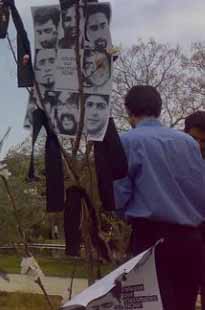| Home > 30 years human rights in Iran > Articles of the Universal Decleration of Human Rights > The Path to Equality, Brotherhood | |||
The Path to Equality, Brotherhood By Abdol-Karim Lahiji Last year marked the 60th anniversary of the ratification of the UN Universal
Declaration of Human Rights. After more than six decades, its articles should have been adopted as a model of behavior by every human being on Earth and enshrined in the practice book of every political leader and statesman. They are after all the ones entrusted with the authority to look after their societies. History will be the judge of whether they have faithfully rendered this responsibility. Article 1 of the Universal Declaration of Human Rights states: All human beings are born free and equal in dignity and rights. They are endowed with reason and conscience and should act towards one another in a spirit of brotherhood.
This Article is the primary basis and foundation of the Universal Declaration of Human Rights. It has been greatly influenced by the 1789 French Declaration of the Rights of Man and of the Citizen. That definition of human rights contains three main principles: freedom, equality and brotherhood, all three of which also appear in the Universal Declaration of Human Rights. What does it all mean? It means that humans are born free. Did you know that before slavery was abolished, even the children of salves were not considered free? This practice is prevalent in religious cultures as well, especially in Islamic societies where religion is forced upon people. When the father is Moslem, the child is born Moslem and is required to stay Moslem forever. The Universal Declaration of Human Rights rejects this principle. This is not a child who is born free. Being born free means that a human being may exercise his or her free will upon attaining a certain age and level of maturity. It is up to the individual to choose to be Moslem, Christian, secular or otherwise. When we say one is born free, this is what we mean by it. This also means that all people are equal from a legal perspective. That means under the law everyone is equal even if that equality does not exist in other spheres of life. Some people are born in affluent and developed countries; others are born in poor and developing countries; some are born healthy, others disabled. But under the law, irrespective of whether one is born in Africa, Asia or Oceania, we are all universally equal. One must never claim a person born in Northern Europe is entitled to a greater degree of human rights protection than someone in Africa, for example. Let me also add that one should not view the issue from only the rigid prism of the law. Even irrespective of social, economic and cultural circumstances, we are all brothers and sisters (though perhaps not in the way 'brother and sister' is used in post-revolutionary Iran). By that I simply mean that human beings should be cordial and sensitive toward one another and lend each other a helping hand. The law does not obligate or require anyone to do so, not even during a natural disaster such as a flood or earthquake. But it is so nice when people do assist those in need. In other words, in addition to legal commitments, which in my professional view is quite impersonal and cold, caring and humanism should be promoted and encouraged in all societies. By doing so, we will be creating a much more pleasant world—a world that is less cold and dried up of humanity. |
|||
 |












